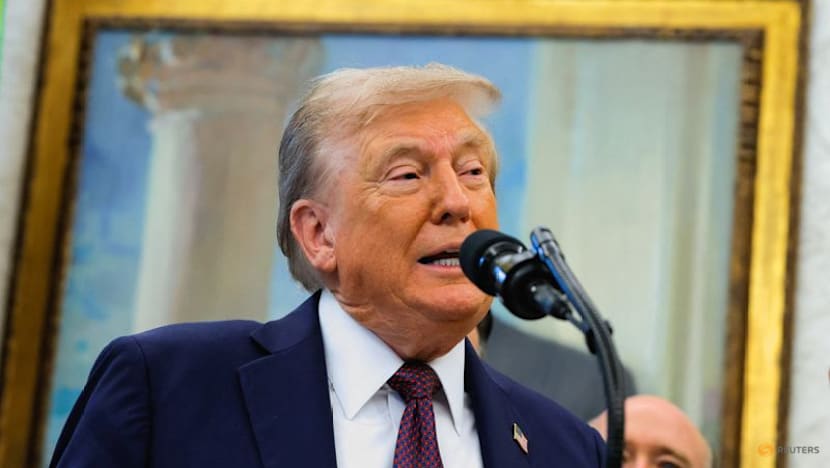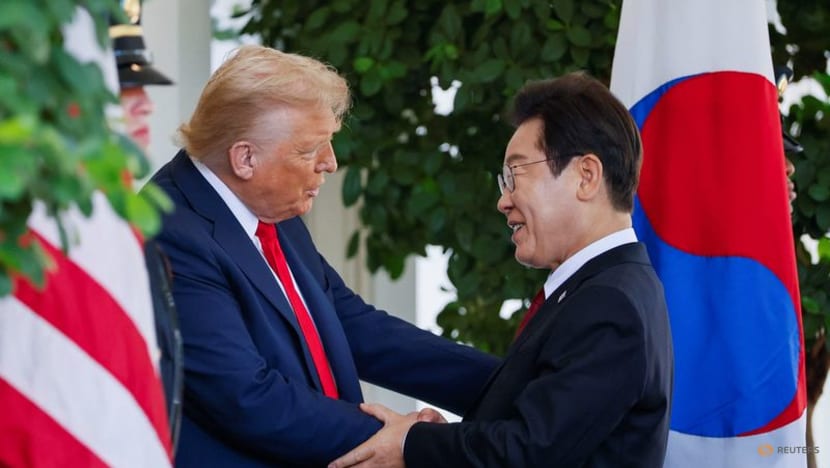Commentary: Donald Trump wants more than gifts and flattery from US partners
The different treatment of South Korea and India underlines a troubling reality about how to win the US president’s favour, says Kevin Chen from S Rajaratnam School of International Studies.


This audio is generated by an AI tool.
SINGAPORE: Over the past two weeks, the world has seen Washington treat two key Asian partners very differently. But they ultimately lead to the same insight about United States President Donald Trump.
Gifts and flattery can help to buy Mr Trump’s favour, but what he really wants is for countries to meet all his demands. Anything less than complete capitulation could trigger a furious reaction.
Despite initial worries of a “potentially explosive” meeting between Mr Trump and South Korean President Lee Jae-myung, the two leaders were all smiles before the cameras. “We really sort of need each other”, Mr Trump told the press.
In comparison, Mr Trump slapped 50 per cent tariffs on imports from India, tied with Brazil for the highest rate in the world. He and his officials claim that the tariffs are punishment for India’s continued importation of Russian oil, which helps Moscow to finance its war in Ukraine.
Despite this claim, Mr Trump’s ire ostensibly hinges on Indian Prime Minister Narendra Modi’s refusal to acknowledge Mr Trump’s claim that he played a key role in facilitating the ceasefire between India and Pakistan in May.
The rift between India and the US was unthinkable about seven months ago when Mr Modi was among the first foreign leaders to visit the White House at the start of Mr Trump’s second term. Yet it is here and widening by the day.
SOUTH KOREA SCORES A DIPLOMATIC VICTORY
Mr Lee’s success in appealing to Mr Trump largely confirmed what observers have suspected about this administration: It is best to come bearing gifts and flattery.
The meeting seemed doomed even before it started. In the days prior, Mr Trump gave ominous warnings about cutting off business ties with Seoul over reported raids on churches. South Korean officials admitted that they feared a “Zelenskyy moment”, referring to the infamous clash between Ukrainian President Volodymyr Zelenskyy and Mr Trump in February.

Mr Lee, however, arrived at the meeting prepared. He not only hailed Mr Trump’s economic acumen and design sense, but also agreed with Mr Trump’s belief that North Korean Leader Kim Jong Un would not have continued to enhance his nuclear capabilities if Mr Trump remained in office in 2020. It was a tactic that many, including UK Prime Minister Keir Starmer and French President Emmanuel Macron, used in meetings with Mr Trump to great effect.
This effusive flattery seemed to defuse Mr Trump’s concerns, acting as a cherry on top of US$350 billion worth of investment deals in areas such as shipbuilding and energy. Though the South Korean delegation did not secure a lower tariff rate, the avoidance of a showdown in the Oval Office was a diplomatic victory.
A BRIDGE TOO FAR FOR INDIA
The case of India, however, underlines a more troubling reality: Gifts and flattery are not enough.
Mr Modi was one of the first leaders to visit Washington back in February, agreeing to negotiate a trade deal that would double bilateral trade to US$500 billion by 2030. As recently as June, a trade agreement with India was supposedly imminent. However, these hopes unravelled, with Mr Trump threatening the 50 per cent tariffs on Jul 31.
Mr Modi’s inability to lower trade barriers to India’s agricultural market due to political constraints played a role in these developments. However, a more persuasive argument points to Mr Trump’s repeated assertions about defusing the India-Pakistan border conflict in May as the issue that drove a wedge in the bilateral relationship.
Mr Modi’s government bristled with the assertion that it needed an external party to handle its affairs, while Mr Trump was upset that India refused to nominate him for the Nobel Peace Prize. This standoff seems to have broken Mr Modi and Mr Trump’s personal relationship, with the New York Times reporting that the two leaders have not spoken since a tense phone call on Jun 17.
One could argue that Mr Modi should have gritted his teeth and acceded to Mr Trump’s demands, accepting temporary embarrassment for economic benefits. Yet doing so ignores India’s agency. What Mr Trump demanded was not simply a deal, but complete capitulation to his demands, especially to be recognised as a statesman by the Nobel committee.
For Seoul, which still depends on the US for security ties, it was a tough, but necessary pill to swallow. For New Delhi, a rising power in its own right, it was a bridge too far.
NOT EVERYTHING IS ABOUT CHINA
It is popular in Asia to assume that the US views all its ties with Asian allies and partners through the prism of competition with China. However, the truth is more complicated.
On many levels, Washington is fixated on competition with China in its foreign affairs. It wants to create a supply chain of rare earths that is less reliant on Beijing. It also wants to crack down on trans-shipments, believing that China is using third countries to bypass trade restrictions.
However, these measures should not obscure Washington’s belief that other countries, including allies and partners, have taken advantage of US largesse. From accusations of South Korea not spending enough on defence to India refusing to open its domestic market further, the Trump administration’s foreign policy contains a strong undercurrent of grievance.
The flipside of this coin is the belief that countries are being ungrateful by resisting American demands, and that they need to demonstrate their gratitude for access to the US market and security guarantee not only with gifts and flattery, but also by meeting personal demands from Mr Trump. Any country refusing to comply would be pressured into submission, often through tariffs.
Japan may soon face a similar challenge, given the cancellation of a Washington visit by its top trade negotiator over unresolved discussions on importing American rice.
This is less “America organising a coalition against China” and more “America against the world.” It reads like an inversion of former US President John F Kennedy’s inaugural address: Ask not what America will do for you, but what you must do for America first.
Kevin Chen is an Associate Research Fellow with the US Programme at the S Rajaratnam School of International Studies (RSIS), Nanyang Technological University (NTU), Singapore. He writes a monthly column for CNA, published every first Friday.



















